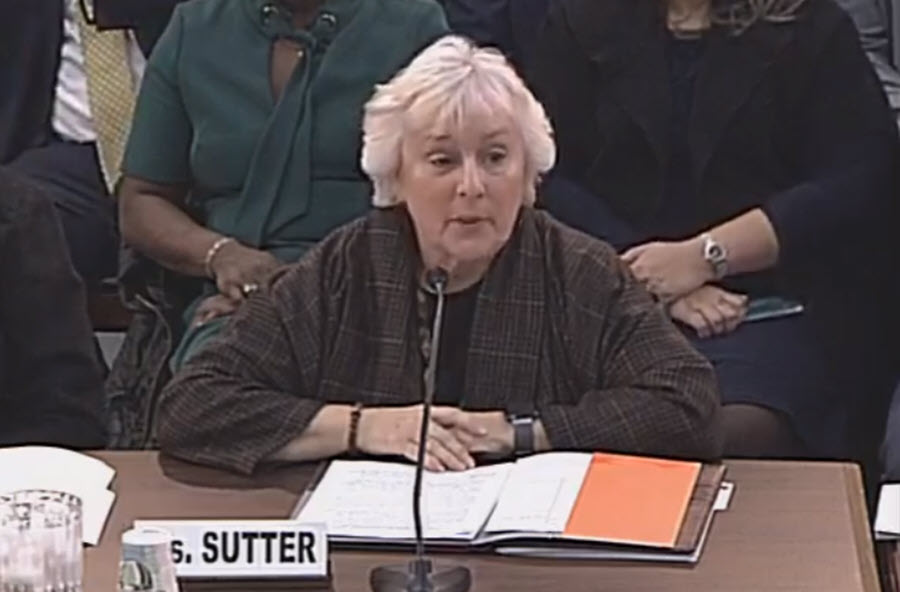NAB's Sutter: Education, Access Are Keys to Ownership Diversity

The smarter way to stay on top of broadcasting and cable industry. Sign up below
You are now subscribed
Your newsletter sign-up was successful
Diane Sutter, president of ShootingStar Broadcasting told Congress Wednesday that there is no question that "we are not where we need to be" in terms of broadcast diversity and that more can be done to boost it. That "more" includes boosting access to capital, to key relationships and the rooms where the deals are done, and professional development.
That came in a hearing on four bipartisan media diversity bills being vetted by the House Communications Subcommittee. Members from both sides of the aisle said more needed to be done given that minorities and women own only about 10% of radio and TV properties, but represent over half the population.
Sutter, speaking on behalf of the National Association of Broadcasters, said that the keys to increasing diversity are "(1) finding access to capital, both equity and debt, for smaller transactions, and (2) locating and purchasing a station with the positive cash flow needed to reassure the bank that they will recoup their loan since broadcast lending is not based on the value of tangible assets."
She said diversity was not only in the public interest, it was good business.
To that end, she offered strong support for one of the four bills, the Expanding Broadcast Ownership Opportunities Act (H.R.3957), which would restore the FCC's minority tax certificate program, which provided a tax break to companies that sold media outlets to minorities and women.
The bill would expand the tax credit and increase reporting requirements.
NAB has a rooting interest in that bill. Sutter pointed out that NAB president Gordon Smith was a lead sponsor of restoring the program while a senator from Oregon.
The smarter way to stay on top of broadcasting and cable industry. Sign up below
Sutter, who rose through the ranks to become a radio and TV station manager then owner, said the key to that rise was the experience she gained doing broadcast ownership deals on behalf of Shamrock Broadcasting, where she said she was able to develop "a broad network of professionals that helped me put together my first deal. Those relationships, before I needed to use them, were essential to helping her "understand how deals are put together, something that is almost impossible to learn as a GM or senior broadcast executive."
NCTA-The National Cable & Television Association president Michael Powell has long argued that relationships, and being in the room when deals get done, are key to minorities getting a bigger share of the media ownership pie.
Sutter, who said access to capital is key, pointed out that she was not able to use the tax certificate when she bought her station because at the time, it only applied to minorities, not women. The current reinstatement bill would correct that.
Asked how she got into ownership, she said she was lucky to get that first station, in part because she had had that Shamrock experience and in part because the first station she bought was the last one the former owners needed to sell.
She also pointed out that a license can't be used as collateral, so it is hard to buy that second and third station.
Sutter told the subcommittee said without "resources, relationships and experience," it was "highly unlikely that I ever would have been become a station owner."
She said that was why the NAB's Broadcast Leadership Training Program, now in its 20th year and which she helped create, was so important.
BLT, which she jokes is "more than just a sandwich," is a " 10-month Executive-MBA style program intended to help talented senior level broadcast executives who aspire to advance as group executives or station owners – particularly women and people of color – to be exposed to the fundamentals of purchasing, owning, and running a successful operation of radio and television stations," she added.
AB also suggests that loosening the guidelines for Small Business Administration loan guarantees could help boost those minority ownership numbers. It says that might incentivize smaller entities that lack the property or track records to satisfy those guidelines.
Contributing editor John Eggerton has been an editor and/or writer on media regulation, legislation and policy for over four decades, including covering the FCC, FTC, Congress, the major media trade associations, and the federal courts. In addition to Multichannel News and Broadcasting + Cable, his work has appeared in Radio World, TV Technology, TV Fax, This Week in Consumer Electronics, Variety and the Encyclopedia Britannica.

